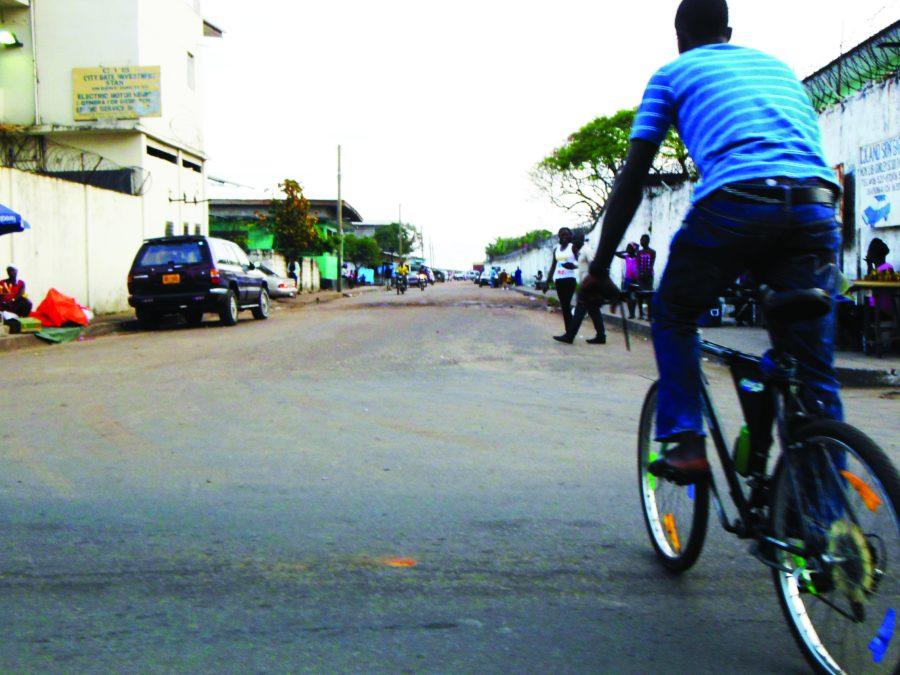“I saw parents killed by their children. I saw children abandoned by their parents. I saw neighbors from rival ethnic groups who had lived together for generations accusing and causing the death of each other,” said Gleh Huston Appleton, describing the Liberian civil war. “I have also seen a nation entrapped by its past due to bad governance.”
Appleton’s experience is not unique. The Liberian civil war, a brutal conflict that lasted for 14 years and ended in 2003, cost 250,000 lives and left the country in ruins.
Today, the relatively small West African nation is still in the process of rebuilding. The vast majority of Liberia’s citizens have no access to the electricity grid, running water, basic health care or high quality education.
So what’s the connection between Appleton, Liberia, and UMass Boston? The answer is Michael Keating.
Keating, a lecturer in the Conflict Resolution program at the McCormack Graduate School and the director of operations at the Center for Peace, Democracy and Development, has been working on issues in Liberia since 2006.
This semester, he is launching a unique pilot program, offering a group of Liberians the opportunity to take his Globalization and Development seminar remotely, alongside UMass Boston graduate students.
Appleton is one of the Liberian students in the class. A development analyst with experience in Liberia, Sudan, Juba and Lesotho, 34-year-old Appleton has a Bachelor of Business Administration Degree from Liberia Christian College and a Masters of Public Administration from the Management Institute of Canada, which he pursued online. One of 14 siblings, he lost both his parents before the age of 10. During the worst periods of the conflict, Appleton experienced extreme hunger. Referring to those days, he describes himself as a “walking skeleton.”
This program, Keating said, was born out of necessity. In his visits to Liberia, many Liberian students approached him about studying in the US.
“They have a strong desire for an American education, but they don’t really know what that entails,” Keating explained. “Educational methods and standards are much different in Liberia, so students don’t know what is expected.”
In order to fill that gap, he organized a group of Liberian graduates from several of the local universities. These students work in the Liberian government, in non-governmental organizations (NGOs) and in the private sector. They do not pay to take part in the seminar, and they won’t receive any college credit for it.
With funding from Academics Without Borders in Canada, Keating found a space where the Liberian students can gather for Skype sessions with their American colleagues. This space is called iLab Liberia, a unique computer lab in the capital city of Monrovia. Sponsored by Google and eBay, among others, iLab has its own satellite, providing the fastest internet connection in the country. ILab’s staff, comprised almost entirely of Liberians, offers free training to Liberians who wish to learn how to use computers and the internet, skills that many of them lack.
The cooperation benefits students on both sides of the Atlantic. Tara Conklin is a graduate student in the international relations program at UMass Boston, and she is taking Keating’s seminar this semester. Conklin already has a connection to Liberia: she was there this summer with Keating, as part of an international internship initiative from the Office of International and Transnational Affairs (OITA). Conklin worked as an intern for a Liberian congresswoman and in the country’s Environmental Protection Agency.
“I think the American students in the class will gain invaluable insight from our Liberian counterparts,” Conklin said. “They can enhance our understanding of development theory by providing specific examples of what we’re learning and educating us on their own experiences and observations from their country.”
Keating agreed. “Of course, the Liberian students are living out in their daily lives the issues that we Americans only read about. For them it is not theory,” he said.
Appleton, who hopes that this experience will help him decide whether or not to pursue a Ph.D. in international development, said that the class is “a great way of transcending cultural boundaries.”
“The course is a proof of globalization at work,” Appleton said. “The mix of the class presents first hand opportunity to classmates in the developed world, who have not or may never experience the impact of international development policies on poor nations of the world. It gives them an appreciation of the deeper implications of each policy instrument on underdeveloped nations.”
Keating plans to continue and expand the UMass Boston’s involvement in Liberia.
“I hope to be able to continue a program like this into the future. It is very low cost, and I believe it can have great potential value for building relationships among students from very different backgrounds who are looking at the same set of problems. Of course, I also hope to will motivate American students to travel to Liberia to work or research or to simply get to know that fascinating place.”
OLYMPUS DIGITAL CAMERA


